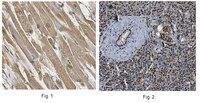ABN439 Sigma-AldrichAnti-PQBP1 Antibody
Anti-PQBP1 is an antibody against PQBP1 for use in WB, IH.
More>> Anti-PQBP1 is an antibody against PQBP1 for use in WB, IH. Less<<Recommended Products
Overview
| Replacement Information |
|---|
Key Spec Table
| Species Reactivity | Key Applications | Host | Format | Antibody Type |
|---|---|---|---|---|
| H | WB, IHC | Rb | Affinity Purified | Polyclonal Antibody |
| References |
|---|
| Product Information | |
|---|---|
| Format | Affinity Purified |
| Presentation | Purified rabbit Polyclonal in buffer containing 0.1 M Tris-Glycine (pH 7.4), 150 mM NaCl with 0.05% sodium azide. |
| Quality Level | MQ100 |
| Physicochemical Information |
|---|
| Dimensions |
|---|
| Materials Information |
|---|
| Toxicological Information |
|---|
| Safety Information according to GHS |
|---|
| Safety Information |
|---|
| Storage and Shipping Information | |
|---|---|
| Storage Conditions | Stable for 1 year at 2-8°C from date of receipt. |
| Packaging Information | |
|---|---|
| Material Size | 100 µg |
| Transport Information |
|---|
| Supplemental Information |
|---|
| Specifications |
|---|
| Global Trade Item Number | |
|---|---|
| Catalogue Number | GTIN |
| ABN439 | 04055977115895 |
Documentation
Anti-PQBP1 Antibody SDS
| Title |
|---|
Anti-PQBP1 Antibody Certificates of Analysis
| Title | Lot Number |
|---|---|
| Anti-PQBP1 | Q2482132 |













